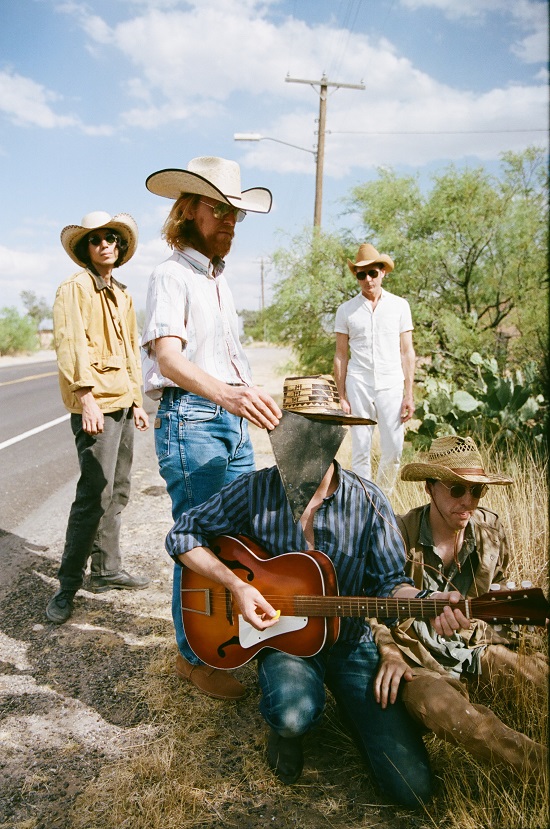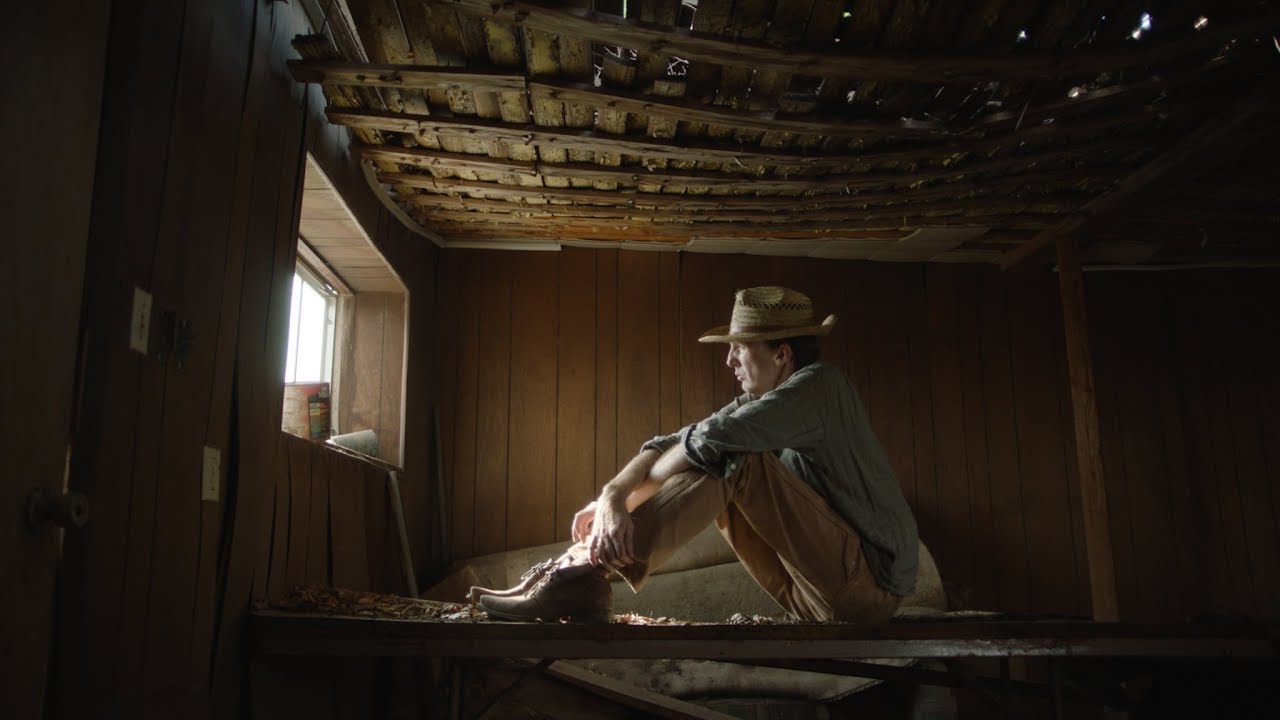I get the impression Bradford Cox is a little bit sick of being interviewed about the new Deerhunter record. He lives in Atlanta, Georgia and he’s a night owl, so that makes it easier to organise a load of European phone interviews, but tQ is apparently quite far down the queue. There’s been so many, he tells me with a sigh, that he’s worried he’s started to get a mid-Atlantic accent. “I’ll end up sounding like a Michael Caine impersonator.”
He’s known as a tricky interviewee, even when he’s not tired of doing phoners, so it’s a good job he likes our website. “I read The Quietus, actually,” he says. “It’s the only thing I read any more. I was just reading an article about The Residents and Pere Ubu releasing Duck Stab and Dub Housing… God, I wish I’d been around for that period.”
Cox constantly meanders off-topic to make grand, self-important proclamations. “4AD wouldn’t dare cross that line with me,” he says, when we discuss a rising trend of labels asking bands to eschew longer songs to stop them being skipped on Spotify. “They wouldn’t dare! They. Wouldn’t. DARE!” Later he challenges a journalist who recently questioned Cox’s vocal range to a karaoke duel. “I can sing in like five octaves. I’m such a great singer, and so underappreciated as a vocalist.”
It’s often hard to tell when he’s joking (I’m still unsure whether he’s genuinely worried about getting cancer from holding the phone to his ear for so long, as he claims) but Cox is self-aware. And when he wants to get something important across, he has no problem.
Last November, the band’s former bassist Josh Fauver, who played in the group from 2004 until 2012, died unexpectedly at the age of 39. “It’s been very hard,” Cox says. “He was irreplaceable, and in many ways he was one of the greatest partners I’ve ever had in a band, because he had no problem being a foil to my ideas. I actually listened. I found it easy to listen when he criticised a choice I’d made or a lyric. I feel like sometimes people want to have an opinion to appear involved. He was always committed to the project, absolutely wanted to make the best records. He’s not replaceable, he never was. It’s like losing a brother.”
Cox wrote his own press release, which is full of slippery bombast like: “Is ‘No One’s Sleeping’ an outtake of an aborted Kinks recording session in 1977 Berlin with Eno producing? No. That is nostalgia. If there is one thing Deerhunter are making clear it is that they have exhausted themselves with that toxic concept.”
“That’s a mix of quite serious and total bullshit,” he says. “I don’t mean I’m putting one over on anyone or trolling – I’m saying things knowing that I’ll have to defend them. I’m probably in the minority of artists in that I write my own press releases, I set the typography on our album covers, I edit our videos, I choose the pantone colours. I wouldn’t call myself a micro-manager, I’m just an aesthete…. But I am not, I repeat, not, a dandy.”
So has he really done away with the ‘toxic concept’ of nostalgia? He wishes he’d been around for the early days of Pere Ubu, after all, and he also mentions that the only albums he gets excited about are reissues; and while preparing Deerhunter’s next live shows he listened back to every one of their albums. Didn’t that make him feel nostalgic?
“What I view as nostalgia is if I listened to these albums and wished I could go back in time. I listen to these albums with abject horror. But also I think they’re brilliant, they’re all classics. I don’t want to sound like a Gallagher but you know, they are proper, classic records.”
Whatever the case, Deerhunter’s new record Why Hasn’t Everything Already Disappeared? should be taken on its own terms. It is a superb album, lush and laden with texture but by far the band’s most direct release to date. Cate Le Bon, whom Cox calls “an outlier”, contributes as both producer and musician, lending a beautiful baroque flourish. It’s dreamlike and deeply melancholy, warm and inviting. Like every Deerhunter LP, It sounds completely different to all of its predecessors. When they recorded, the band plugged their guitars straight into the mixing desk, keen to avoid unnecessary frills. “We wanted to create a sound that’s sculptural. We were quite interested in the brutalist sound, the brutalist architecture. I was interested in vorticism, not the fascist elements of it, but Ezra Pound and the vorticist poets. Geometric art and Russian watercolours.”
Cox is on fine form as a singer, both in sound and with a set of lyrics that are at times breathtaking in their poetry. They were written, as his lyrics always are, in his stream-of-consciousness style, so their ‘meaning’ is a matter of interpretation for him as well as for us. There are threads we can trace, however. Starting with its title, Why Hasn’t Everything already Disappeared?, which signals the start of many apparent references to death, endings, violence and the apocalypse (an interpretation made by tQ’s Diva Harris in her excellent album review).
“Curtain call for all those lives spent surviving for that final day,” he sings on ‘Element’; “There is peace / The great beyond,” he sings on ‘What Happens To People’; ‘Tarnung’, where Lockett Pundt takes lead vocals, talks of “A place to fade away / Phase of gold light”; in the liner notes Cox calls final track ‘Nocturne’ a “live stream from the afterlife”. I ask if there might be spiritual undertones to the record. “Hmmmm,” he sighs. “I think it’s a very terrestrial album. It’s not very cosmic. What music do you associate with the cosmic? Let me answer for you. I imagine psychedelic music. I’m anti-psychedelic – a non-Italian realist.”
What is he referring to when he repeats the words “Faith I take” on one of the album’s finest tracks, ‘Futurism’? “You can have faith in people, you can have faith in a man not shooting you if he’s got a gun. When I refer to ‘the other side’, maybe it’s about who’s watching us through our cellphone… There’s ways to avoid spirituality in analysing the lyrics. They’re a bit abstract and they’re written in a stream of conscious, but I wasn’t imbued with a sense of the cosmic.”

There’s a surrealism of sorts that can be offered by the technological though, as on ‘Détournement’, an ethereal piece that floats above the rest of the album, surveying the entire globe, country by country, with an icy glare. Cox says many have called the track vaporwave – much to his distaste. “I find that a bit offensive, but I do know what they mean… I understand there’s that liquid, shopping mall, hollow kind of sound, an airport sound. I don’t mean Music For Airports, more like when you’re in an airport and there’s all these digital announcements. It’s if those digital announcements had a sentient intelligence and started a group.”
If there is one interpretation that the two of us can agree on, it’s that this record is informed by the tumult of its own era. In less completely fucked times Cox has called Deerhunter apolitical, but now, he says, “that’s not so easy, is it? In the past you always had the sense there was somebody in control who had an ounce of integrity, that there was some kind of boundary of stupidity. You’d think, This is as bad as it can get.” And if you’re working with a stream-of-consciousness style, in times like ours, then “what goes in is gonna come out,” as Cox puts it.
In the liner notes he makes reference to Jo Cox, the British MP murdered by a man who called her a ‘traitor’ and shouted ‘Britain first’ as he carried out the attack. On ‘No One’s Sleeping’ he sings of “Great unrest / In the country there’s much duress / Violence has taken hold…”
““I felt weird about writing it,” he says. “ I felt it was almost disrespectful to her family or her memory to say her death inspired what’s bound to be called an indie-rock song. Her death is a lot more tragic than what can be summed up by a song that essentially sounds like Roxy Music.
“It’s just the truth, though. I read about [her murder] in the middle of the night over here. I was taking a break, brewing tea, getting ready to go back to the piano, I had my recorder all set up, and it was what was on my mind. I didn’t sit down and write ‘The Ballad of Joanne Cox’ – an impressionistic sort of dread informed that song, [a dread] that her death brought out into my environment.”
Like many excellent bands, Deerhunter’s career has been defined by contradictions and juxtapositions – from their constantly morphing sound to their sprawling interview style. Why Hasn’t Everything Already Disappeared? contains one of their most beautiful paradoxes to date: for all its explorations of death, creeping fascism, alienation, technology and ‘toxic concepts’, for all the influences it takes from brutalism and vorticism, it still sounds beautiful, earthy and comforting. It is affecting in a way that Deerhunter have never been before. “We were trying very clearly to make a sound that was quite ugly, but beautiful in that ugliness,” Cox says.
His father, credited as James ‘Dad’ Cox, contributed a bass vocal on ‘Elemental’. “He comes over every Monday, on his day off, to see Faulkner his grand-dog; they have a very special dog-grandfather relationship. The rest of the week he’s working at Home Depot. I had to go to the studio after our walk with the dog, and I asked if he wanted to come along – he used to sing bass in a barbershop quartet. I thought this was a wonderful and sentimental opportunity and so I filmed it, all very unplanned and improvised. He was quite embarrassed because he hadn’t come over expecting to be put in front of a Neumann microphone that day with a camera in his face. But it was really a special moment for me, and for him. I love my dad.”
At this point, we’ve overrun by ten minutes and the next interviewer, from the Danish press, is trying to get through to him. “My God!” he says, just as things were getting sentimental. “It never ends!”
Deerhunter’s new album Why Hasn’t Everything Already Disappeared? is out tomorrow (January 18). The band play Field Day festival on 7-8 June along with Skepta, Pusha T and more.




